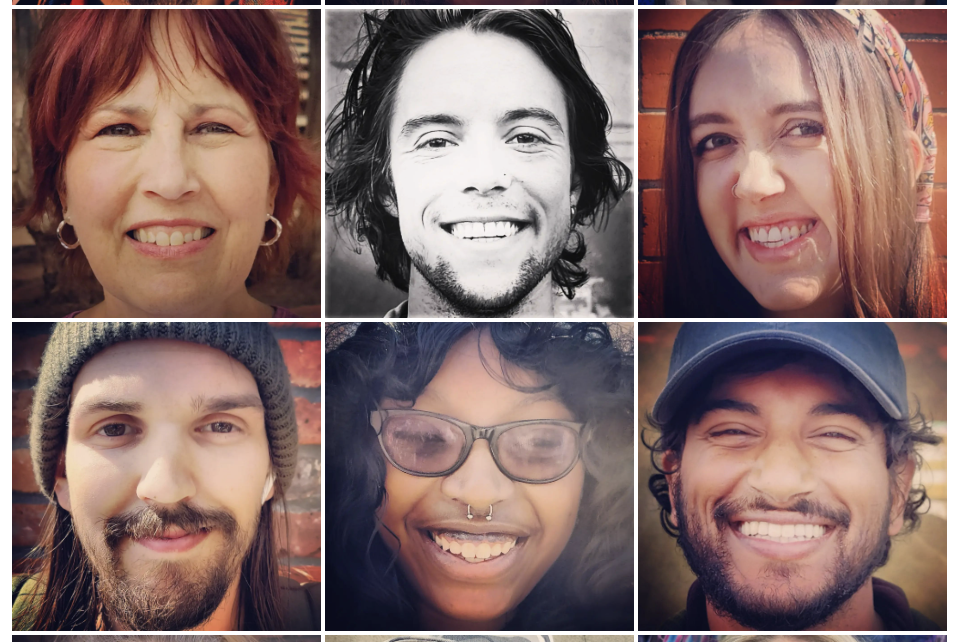Photographer brings people together through a ‘quilt of humanity’

DENVER — It’s a Sunday morning in May, and the South Pearl Street farmer’s market is bustling. The blocked-off streets are lined with vendors under white tents selling fresh fruit and vegetables, smoothies, baked goods and so much more. Faces blur past, happily chatting under a warm spring sun.
Andy Lurie stands on the sidelines, scanning the crowd.
“I like to look for things that stand out to me,” he says. “I love hats, colorful scarves, interesting facial features.”
Lurie is looking for models, a diverse group of faces that will continue to make up the metaphorical patches of his ‘American Quilt Project’.

He spots a woman with light brown hair. She’s wearing a pink head scarf, a silver nose ring and she’s holding a puppy.
“The puppy is cute, but he won’t make it in the picture,” Lurie jokes.
He walks over, business card at the ready, and begins a speech he’s delivered hundreds of times before. He explains that the American Quilt Project is a virtual photography exhibition, shared on Instagram, made up of thousands of faces from across the Denver metro.
The woman agrees to be photographed. Lurie leads her to a nearby brick wall, holds up his cell phone — it’s the subject matter, not the technology for Lurie — snaps a few pictures and then the subject is on her way. Lurie will repeat this process at least 15 times today. Only a few decline his offer to be a part of his great American Quilt.
Rocky Mountain PBS first met Lurie in February of 2022. He was about five years into his project and had amassed around 5,000 portraits, face after face documented on his Instagram page.
Lurie started the American Quilt Project in 2017 amid rising tensions across the country.
“There’s certain things that happened politically then, [and] at the time I was really motivated to do something like this because of the political climate,” said Lurie. “There was a lot of bad feelings circulating in the air and divisiveness… I started doing this as a way to counteract the divisiveness and bring people together.”
So, he started collecting photographs at festivals, concerts, malls and markets. At first, he printed them and created framed collages. Many of his first portraits still line the walls of his apartment. But he knew he wanted to share this idea with a wider audience. After a conversation with a friend, he decided Instagram would be the perfect platform — the app’s square design lends itself nicely to the idea of a metaphorical quilt. He started posting and hasn’t stopped, even continuing his work through the COVID-19 pandemic.
“I realized that this actually makes people feel good, including me … so I just kept doing it,” Lurie explained. “It’s the actual act of doing it, the process, it’s redemptive. I just can’t wait to get out the door.”
Now, over one year since our first meeting, Lurie has added at least one thousand new portraits to his project. And, thanks to help from friend Emy Pye, he’s finally gotten to see a taste of his original vision — a quilt, in digital form, featuring over 5,000 different faces.

“I’m just really happy with the result,” Lurie beamED. “And from a distance it really looks like a quilt, it looks like something that’s a textile, I’m really happy with it.”
Lurie’s ultimate dream would be to turn this digital ‘quilt of humanity’ into a physical one.
“I would love to do that if I had the means to do that, but it would be too big of a project for me to do on my own,” Lurie said. “Someday, maybe.”
Until then, you can find Lurie at the South Pearl Street farmers market, every Sunday, searching for more patches to add to his quilt.
Alexis Kikoen is the executive producer with Rocky Mountain PBS. You can reach her at alexiskikoen@rmpbs.org